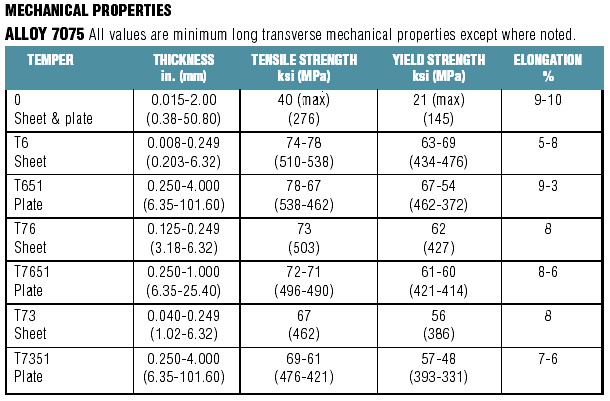Al 7075 Stress Corrosion Cracking Aluminum

Stress corrosion cracking of Al7075 alloy processed by equal channel. Stress corrosion cracking, Al 7075. The 7xxx series aluminum alloys (Poulose et al. Improvements in mechanical and stress corrosion cracking properties in Al-alloy 7075 via retrogression and reaging. Aluminum alloy 7075 has been widely studied.
7075 aluminium alloy is an, with as the primary alloying element. It is strong, with a strength comparable to many steels, and has good fatigue strength and average machinability. Autodesk Maya 2011 32bit Crack. It has lower resistance to corrosion than many other aluminium alloys, but has significantly better corrosion resistance than the 2000 alloys. Its relatively high cost limits its use.
7075 aluminium alloy's composition roughly includes 5.6–6.1%, 2.1–2.5%, 1.2–1.6%, and less than a half percent of silicon, iron, manganese, titanium, chromium, and other metals. It is produced in many, some of which are 7075-0, 7075-T6, 7075-T651. The first 7075 was developed in secret by a Japanese company,, in 1943. 7075 was eventually used for airframe production in the. Contents • • • • • • • • • • • • • Basic properties [ ] Aluminium 7075A has a density of 2.810 g/cm³ (0.1015 lb/in³). Mechanical properties [ ] The mechanical properties of 7075 depend greatly on the temper of the material. 7075-0 [ ] Un-heat-treated 7075 (7075-0 temper) has maximum no more than 280 MPa (40,000 psi), and maximum no more than 140 MPa (21,000 psi).
The material has an elongation (stretch before ultimate failure) of 9–10%. As is the case for all 7075 aluminum alloys, 7075-0 is highly corrosion-resistant combined with generally acceptable strength profile. 7075-T6 [ ] T6 temper 7075 has an ultimate tensile strength of 510–540 MPa (74,000–78,000 psi) and yield strength of at least 430–480 MPa (63,000–69,000 psi). It has a failure elongation of 5–11%.

The T6 temper is usually achieved by homogenizing the cast 7075 at 450 °C for several hours, quenching, and then aging at 120 °C for 24 hours. This yields the peak strength of the 7075 alloy.
The strength is derived mainly from finely dispersed eta and eta' precipitates both within grains and along grain boundaries. 7075-T651 [ ] T651 temper 7075 has an ultimate tensile strength of 570 MPa (83,000 psi) and yield strength of 500 MPa (73,000 psi). It has a failure elongation of 3–9%. These properties can change depending on the form of material used.
Thicker plate may exhibit lower strengths and elongation than the numbers listed above. 7075-T7 [ ] T7 temper has an ultimate tensile strength of 505 MPa (73,200 psi) and a yield strength of 435 MPa (63,100 psi). It has a failure elongation of 13%. T7 temper is achieved by overaging (meaning aging past the peak hardness) the material. This is often accomplished by aging at 100–120 °C for several hours and then at 160–180 °C for 24 hours or more. The T7 temper produces a micro-structure of mostly eta precipitates. In contrast to the T6 temper, these eta particles are much larger and prefer growth along the grain boundaries.
This reduces the susceptibility to stress corrosion cracking. T7 temper is equivalent to T73 temper. 7075-RRA [ ] The retrogression and reage (RRA) temper is a multistage heat treatment temper. Starting with a sheet in the T6 temper, it involves overaging past peak hardness (T6 temper) to near the T7 temper. A subsequent reaging at 120 °C for 24 hours returns the hardness and strength to or very nearly to T6 temper levels.
RRA treatments can be accomplished with many different procedures. The general guidelines are retrogressing between 180–240 °C for 15 min 10 s. Transfer Recordings From Rogers Pvr To Usb on this page.
Uses [ ] Due to their high 7000 series alloys such as 7075 are often used in transport applications, including marine, automotive and aviation. These same properties lead to its use in rock climbing equipment, bicycle components, inlineskating-frames and hang glider airframes are commonly made from 7075 aluminium alloy. Hobby grade commonly use 7075 and 6061 for chassis plates. 7075 is used in the manufacturing of for the American military. In particular high quality M16 rifle lower and upper receivers as well as extension tubes are typically made from 7075-T6 alloy.,, and French armament company use it for their precision rifles. It is also commonly used in shafts for sticks, such as the STX sabre, and camping knife and fork sets.